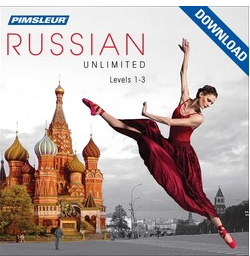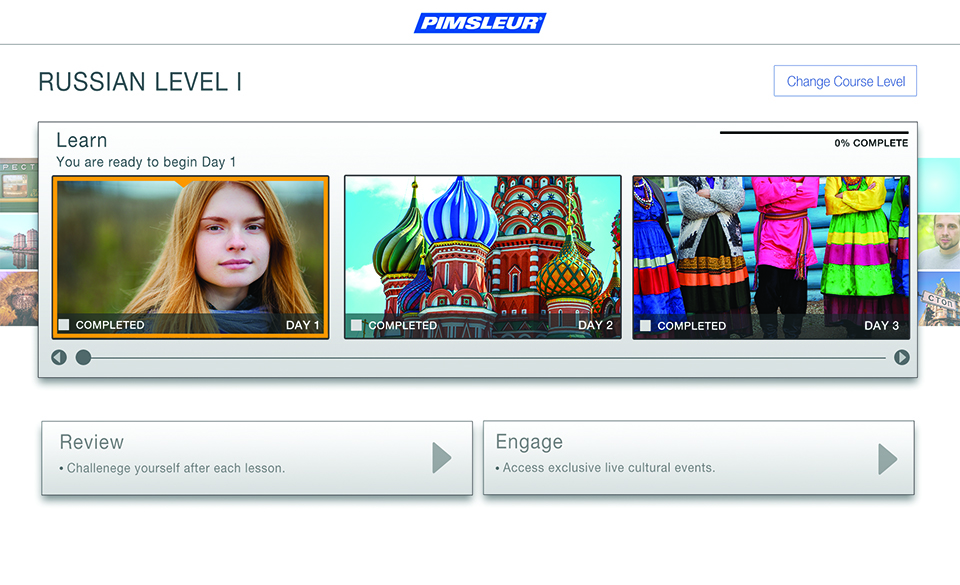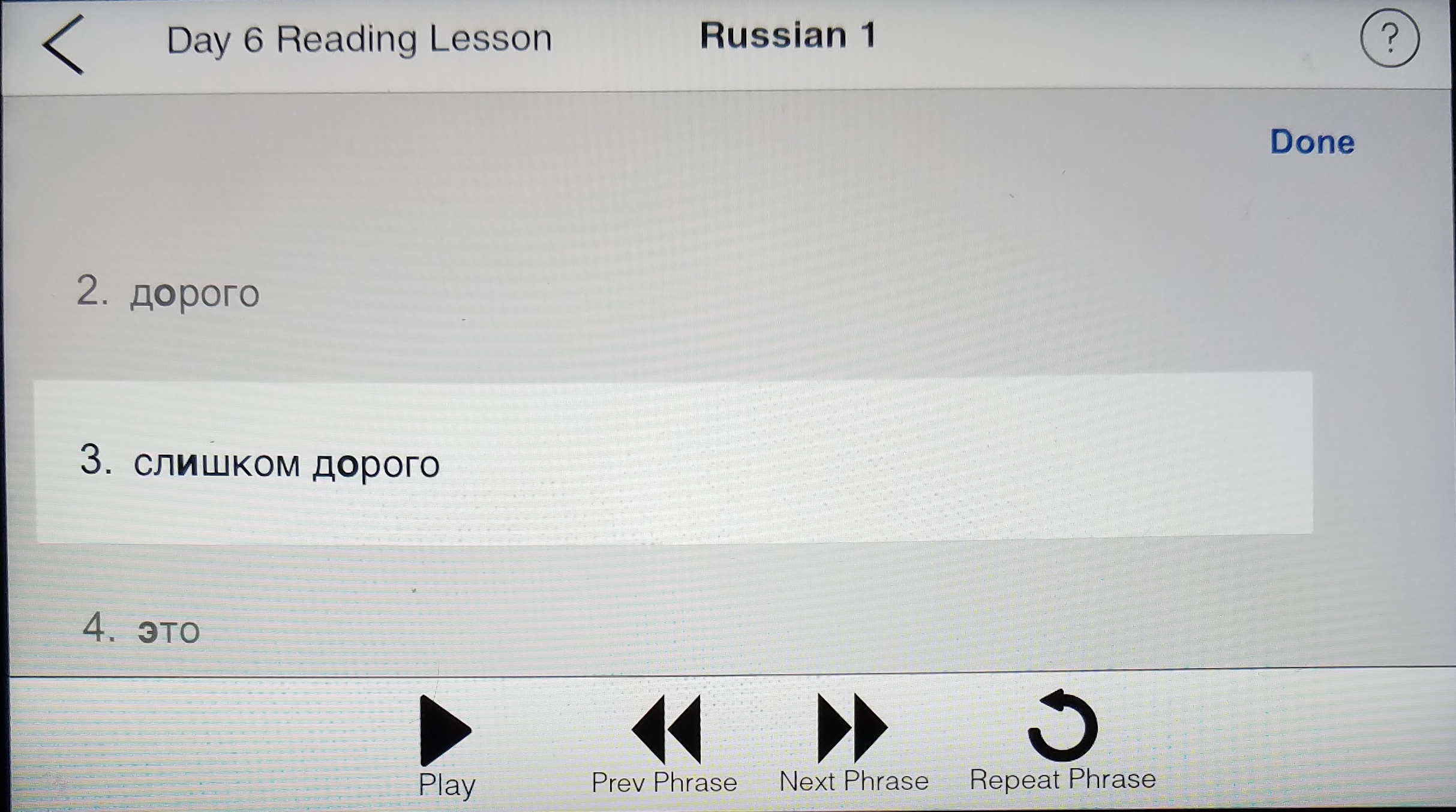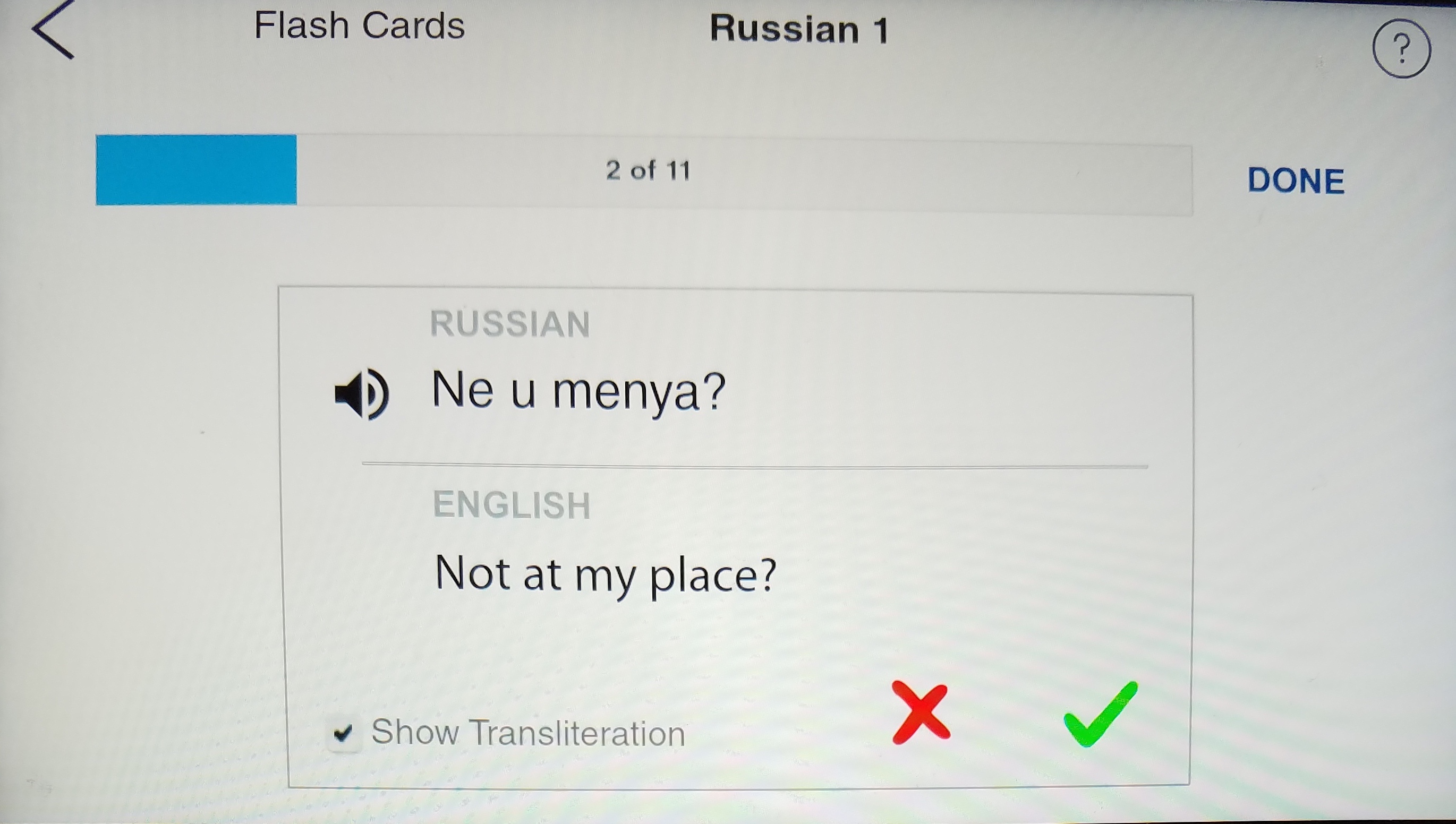Pimsleur – Learning Russian – a Review
 If you're learning Russian, Pimsleur's Unlimited app is a versatile option to consider.
If you're learning Russian, Pimsleur's Unlimited app is a versatile option to consider.
A couple of months ago, I wrote about the then newly-released app for Pimsleur German. Since I'm bilingual in German and English, I couldn't talk about learning German. In that earlier post I described the app and its features. I also talked about the Pimsleur method in general.
This review of Pimsleur Unlimited Russian is a little different. Russian is a new language for me and my first Slavic language. The languages I speak all belong to the Germanic or Romance language families.
AUDIO LESSONS
The core structure of the course consists of 30, thirty-minute audio lessons, presented as Day 1, Day 2, etc., through Day 30. Each day shows a beautiful picture and gives you some brief cultural information (when you tap on the light bulb image). It's classic Pimsleur Audio. 
You hear an initial conversation that adds one new word or phrase, which is explained. New words are introduced later in the lesson. Each unit's initial conversation has only one new word or phrase.
You listen to new words and repeat them with backward buildup. A spaced recall schedule helps you remember words and phrases over the long term. This direct audio training helps you to develop a good pronunciation.
To learn Russian, I need some extra help, though. To learn difficult words and phrases, I've written up flashcards using 3"x5" index cards. Writing these out by hand helps me to memorize them. They also give me the chance to practice the words in a different way. I've started adding the Cyrillic spelling for the words, which is a good method for practicing the Cyrillic alphabet.
In the next couple of weeks of learning Russian, I'll start looking at some basic Russian grammar. I'll then better understand the word order of some sentences, and why some of the endings change.
READING LESSONS
 There's a tab for Reading Lessons on the audios. There are nine Reading Lessons which can be accessed from Day 2 to Day 10. (No Reading Lessons after Day 10.)
There's a tab for Reading Lessons on the audios. There are nine Reading Lessons which can be accessed from Day 2 to Day 10. (No Reading Lessons after Day 10.)
Together, the Reading Lessons take you through 320 Russian words or phrases. The first 200 help you to learn the Cyrillic alphabet, letter by letter, in the context of words and short phrases. The last 120 items are for practice.
The words in the Reading Lesson are not translated and many of them are never taught in the Audio Lessons. However, you hear the correct pronunciation of every word, phrase, and sentence you see and tap on, and thereby learn the correlation between Cyrillic letters and their sound.
DO THE READING LESSONS WORK?
I did all the Reading Lessons in two days (about an hour each day). By the time I reached the practice lessons, I was pretty good at sounding out most of the words. My pronunciation wasn't perfect, but it was close.
I was amazed how quickly I could figure out the sound of individual words I had never seen before. It's also been fun to see a familiar word here and there and go "Aha - that's how it's written!" That doesn't mean that I can now read texts in Cyrillic. Reading for meaning is a whole different world. It's the next step and something I'll need to practice a lot.
FLASH CARDS, QUICK MATCH & SPEAK EASY
 Each lesson has three specific review exercises, Flash Cards, Quick Match, and Speak Easy. You can do any of the review exercises whenever you want.
Each lesson has three specific review exercises, Flash Cards, Quick Match, and Speak Easy. You can do any of the review exercises whenever you want.
For the Flash Cards, you hear the audio and see a written version of the new words and phrases of the lesson. At the bottom of the card, you have the option to check "Show Transliteration" (which shows you the words in transliterated spelling). Otherwise, you'll see the words written in Cyrillic. (You can even go back and forth between Transliteration and Cyrillic script on each card.)
In the Quick Match exercises you get an English sentence, audio and written. You then choose the correct match for the Russian, either in Transliteration or in Cyrillic. (If you wish, you can toggle between the two.) Once you tap on an answer (even if it tells you it's incorrect), you'll hear the audio.
In the Speak Easy exercises you practice and engage in the conversations of each lesson, by listening, reading, and finally taking the role of one of the speakers. The conversation lines are in Cyrillic, and you can add the Transliteration.
Together, these exercises help you memorize the words and practice your pronunciation. Once you've done the Reading Lessons and know the Cyrillic alphabet, the Flash Cards, Quick Match, and Speak Easy exercises are a great way to start practice reading for meaning.
I like all of these exercises. They give a quick review, they're fun to do, and are a way to stay engaged.
LEARNING ON THE GO
Playing your language program while you're doing something else: driving, running, cooking, washing dishes, etc. is definitely convenient. I sometimes listen to Italian or Spanish while cooking, now that I'm on an upper intermediate (B2) level in those languages.
But when I start out with a new language, I have found that I do my best learning when I'm alone, when I've put time aside, and can really focus on the learning itself. I can listen without distraction, repeat words aloud as many times as I want, stop and write myself notes, create my paper flashcards, etc. This is where I'm now with learning Russian.
Then, once the words and sounds are in my brain, playing them again while my mind is half on something else will be okay too. I also know that I'm still a long way from being able to understand Russian conversations. So for now, I have to listen and learn with focus wherever I can find some quiet time with my app.
CAN YOU DO 30 LESSONS IN 30 DAYS?
Maybe I could, if I were relearning a language I had taken in school or college. But for Russian, I've not been able to do a new lesson every day. I've had some interruptions (holidays, travel, flu). More importantly though, I've found the need to go back to earlier lessons and review sentences that I find hard.
The key to learning Russian, or any other language for that matter, is doing something every day. It could be redoing a lesson, or part of one. Or it could be going back and playing some of the Flash Card, Quick Match, or Speak Easy exercises.
I have now finished just over half of the course. I feel I'm well-launched into learning Russian. My pronunciation is pretty good, I know the Cyrillic letters, I'm starting to recognize some words, and I can automatically recall some of the basic words and phrases.
Most of all, I continue to feel motivated. The more I'm learning, the more I'm getting excited about learning more.
COST
For more information about Pimsleur Premium and Special Offers, go to Pimsleur.com
Bio: Ulrike Rettig is the co-founder of GamesforLanguage.com. She is a lifelong language learner, growing up in Austria, the Netherlands, and Canada. You can follow her on Facebook, Twitter and Instagram, and leave any comments with contact or below.
Disclosure: Ulrike Rettig was the Development Editor/Author of Pimsleur's German Levels 1, 2 and 3, written during the time she worked for Pimsleur Language Programs (owned since 1997 by Simon & Schuster Audio). She left Pimsleur in 2010. GamesforLanguage has no business relationship with Simon & Schuster Audio, other than receiving the German and Russian Unlimited apps for free.
